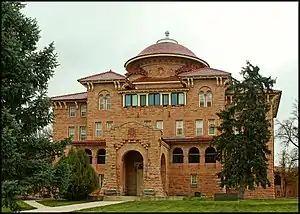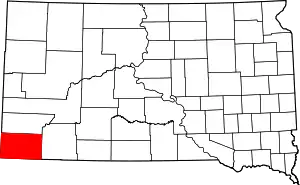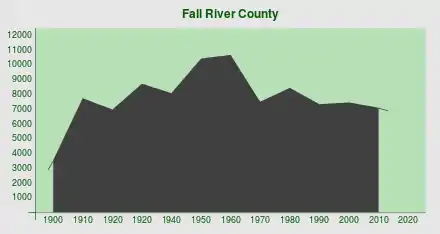Fall River County, South Dakota
Fall River County is a county in the U.S. state of South Dakota. As of the 2010 United States Census, the population was 7,094.[1] Its county seat is Hot Springs.[2] The county was founded in 1883. It is named for Fall River which runs through it.[3]
Fall River County | |
|---|---|
 | |
 Location within the U.S. state of South Dakota | |
 South Dakota's location within the U.S. | |
| Coordinates: 43°15′N 103°31′W | |
| Country | |
| State | |
| Founded | April 3, 1883 |
| Named for | Fall River |
| Seat | Hot Springs |
| Largest city | Hot Springs |
| Area | |
| • Total | 1,749 sq mi (4,530 km2) |
| • Land | 1,740 sq mi (4,500 km2) |
| • Water | 9.2 sq mi (24 km2) 0.5% |
| Population (2010) | |
| • Total | 7,094 |
| • Estimate (2018) | 6,758 |
| • Density | 4.1/sq mi (1.6/km2) |
| Time zone | UTC−7 (Mountain) |
| • Summer (DST) | UTC−6 (MDT) |
| Congressional district | At-large |
| Website | fallriver |
Geography
Fall River County lies at South Dakota's SW corner. Its south borderline abuts the north borderline of the state of Nebraska, and its west borderline abuts the east borderline of the state of Wyoming. The Fall River County terrain contains a mountainous area in the north-central portion, with rolling hills in the rest of the county. Outside the mountainous area, the county's highest point is its SW corner, at 3,970' (1210m) ASL. Of the several peaks in the mountainous area, one in the NE portion of that zone rises to 4,646' (1416m) ASL. The terrain slopes to the north and east. Discharging from the Angosture Reservoir, the Cheyenne River flows northeasterly through the upper part of the county, departing the county through its north boundary line into Custer County.
Fall River County has a total area of 1,749 square miles (4,530 km2), of which 1,740 square miles (4,500 km2) is land and 9.2 square miles (24 km2) (0.5%) is water.[4]
Adjacent counties
- Custer County - north
- Oglala Lakota County - east
- Dawes County, Nebraska - southeast
- Sioux County, Nebraska - south
- Niobrara County, Wyoming - west
Protected areas
- Angostura Reservoir State Game Production Area
- Angostura State Recreation Area[5]
- Bailey State Lakeside Use Area
- Battle Mountain State Game Production Area
- Black Hills National Forest (partial)
- Buffalo Gap National Grassland (partial)
- Friendshuh State Game Production Area (partial)
- Hill Ranch State Game Production Area
- Oral State Game Production Area
- Romey State Game Production Area
- Scherbarth State Game Production Area
- Sheps Canyon State Lakeside Use Area
- Sheps Canyon State Recreation Area[6]
- Williams Dam State Game Production
Lakes
- Angostura Reservoir
- Coldbrook Lake
- Cottonwood Springs Lake
Demographics
| Historical population | |||
|---|---|---|---|
| Census | Pop. | %± | |
| 1890 | 4,478 | — | |
| 1900 | 3,541 | −20.9% | |
| 1910 | 7,763 | 119.2% | |
| 1920 | 6,985 | −10.0% | |
| 1930 | 8,741 | 25.1% | |
| 1940 | 8,089 | −7.5% | |
| 1950 | 10,439 | 29.1% | |
| 1960 | 10,688 | 2.4% | |
| 1970 | 7,505 | −29.8% | |
| 1980 | 8,439 | 12.4% | |
| 1990 | 7,353 | −12.9% | |
| 2000 | 7,453 | 1.4% | |
| 2010 | 7,094 | −4.8% | |
| 2019 (est.) | 6,713 | [7] | −5.4% |
| US Decennial Census[8] 1790-1960[9] 1900-1990[10] 1990-2000[11] 2010-2018[1] | |||

2000 census
As of the 2000 census,[12] there were 7,453 people, 3,127 households, and 1,976 families in the county. The population density was 4 people per square mile (2/km2). There were 3,812 housing units at an average density of 2 per square mile (1/km2). The racial makeup of the county was 90.51% White, 0.32% Black or African American, 6.05% Native American, 0.23% Asian, 0.05% Pacific Islander, 0.30% from other races, and 2.54% from two or more races. 1.74% of the population were Hispanic or Latino of any race. 33.6% were of German, 12.1% English, 9.5% Norwegian and 7.0% Irish ancestry.
There were 3,127 households, out of which 23.70% had children under the age of 18 living with them, 50.90% were married couples living together, 8.50% had a female householder with no husband present, and 36.80% were non-families. 32.70% of all households were made up of individuals, and 14.60% had someone living alone who was 65 years of age or older. The average household size was 2.23 and the average family size was 2.82.
The county population contained 22.80% under the age of 18, 5.80% from 18 to 24, 20.60% from 25 to 44, 28.30% from 45 to 64, and 22.50% who were 65 years of age or older. The median age was 46 years. For every 100 females there were 109.80 males. For every 100 females age 18 and over, there were 103.80 males.
The median income for a household in the county was $29,631, and the median income for a family was $37,827. Males had a median income of $30,646 versus $20,017 for females. The per capita income for the county was $17,048. About 7.80% of families and 13.60% of the population were below the poverty line, including 18.90% of those under age 18 and 9.80% of those age 65 or over.
2010 census
As of the 2010 census, there were 7,094 people, 3,272 households, and 1,899 families in the county.[13] The population density was 4.1 inhabitants per square mile (1.6/km2). There were 4,191 housing units at an average density of 2.4 per square mile (0.93/km2).[14] The racial makeup of the county was 88.6% white, 7.1% American Indian, 0.7% black or African American, 0.4% Asian, 0.3% from other races, and 2.9% from two or more races. Those of Hispanic or Latino origin made up 2.2% of the population.[13] In terms of ancestry, 39.7% were German, 12.6% were Irish, 11.2% were English, 8.4% were Norwegian, 5.9% were Dutch, and 2.3% were American.[15]
Of the 3,272 households, 20.4% had children under the age of 18 living with them, 46.2% were married couples living together, 8.9% had a female householder with no husband present, 42.0% were non-families, and 37.6% of all households were made up of individuals. The average household size was 2.10 and the average family size was 2.74. The median age was 50.5 years.[13]
The median income for a household in the county was $35,833 and the median income for a family was $53,750. Males had a median income of $36,495 versus $32,058 for females. The per capita income for the county was $21,574. About 11.4% of families and 17.4% of the population were below the poverty line, including 11.3% of those under age 18 and 21.3% of those age 65 or over.[16]
Communities
Cities
Town
Unincorporated communities
Unorganized territories
- Northeast Fall River
- Southwest Fall River
Politics
Fall River voters have been reliably Republican for decades. In no national election since 1936 has the county selected the Democratic Party candidate.
| Year | Republican | Democratic | Third party | |||
|---|---|---|---|---|---|---|
| No. | % | No. | % | No. | % | |
| 2020 | 71.2% 2,878 | 26.05% 1,053 | 2.75% 111 | |||
| 2016 | 70.5% 2,511 | 23.0% 821 | 6.5% 231 | |||
| 2012 | 64.2% 2,258 | 32.4% 1,140 | 3.4% 118 | |||
| 2008 | 61.6% 2,348 | 35.1% 1,338 | 3.2% 123 | |||
| 2004 | 62.8% 2,413 | 34.5% 1,326 | 2.8% 106 | |||
| 2000 | 63.7% 2,185 | 33.0% 1,133 | 3.2% 111 | |||
| 1996 | 47.3% 1,636 | 39.2% 1,357 | 13.5% 465 | |||
| 1992 | 40.8% 1,533 | 37.7% 1,416 | 21.5% 805 | |||
| 1988 | 58.6% 2,002 | 40.4% 1,380 | 1.0% 35 | |||
| 1984 | 70.4% 2,748 | 29.1% 1,135 | 0.6% 22 | |||
| 1980 | 69.6% 2,831 | 24.2% 982 | 6.2% 254 | |||
| 1976 | 56.6% 2,046 | 42.5% 1,537 | 0.9% 32 | |||
| 1972 | 67.9% 2,374 | 31.7% 1,107 | 0.5% 16 | |||
| 1968 | 59.6% 1,843 | 31.2% 965 | 9.2% 286 | |||
| 1964 | 54.3% 2,026 | 45.7% 1,706 | ||||
| 1960 | 63.6% 2,492 | 36.4% 1,426 | ||||
| 1956 | 67.4% 2,377 | 32.6% 1,150 | ||||
| 1952 | 74.0% 2,863 | 26.0% 1,008 | ||||
| 1948 | 59.7% 2,037 | 39.5% 1,348 | 0.8% 26 | |||
| 1944 | 63.3% 1,938 | 36.7% 1,122 | ||||
| 1940 | 63.3% 2,420 | 36.7% 1,405 | ||||
| 1936 | 47.1% 1,876 | 48.4% 1,927 | 4.5% 179 | |||
| 1932 | 33.5% 1,351 | 64.6% 2,603 | 1.9% 75 | |||
| 1928 | 63.5% 2,216 | 36.1% 1,258 | 0.4% 15 | |||
| 1924 | 52.1% 1,392 | 12.8% 342 | 35.1% 936 | |||
| 1920 | 61.0% 1,236 | 33.6% 680 | 5.4% 110 | |||
| 1916 | 40.6% 668 | 56.1% 922 | 3.3% 54 | |||
| 1912 | 42.2% 712 | 57.9% 977 | ||||
| 1908 | 57.6% 726 | 37.0% 466 | 5.4% 68 | |||
| 1904 | 71.2% 777 | 22.7% 248 | 6.1% 66 | |||
| 1900 | 55.0% 521 | 44.4% 421 | 0.6% 6 | |||
| 1896 | 48.7% 530 | 51.0% 555 | 0.4% 4 | |||
| 1892 | 53.7% 569 | 24.7% 262 | 21.5% 228 | |||
See also
| Wikimedia Commons has media related to Fall River County, South Dakota. |
References
- "State & County QuickFacts". United States Census Bureau. Archived from the original on June 7, 2011. Retrieved November 25, 2013.
- "Find a County". National Association of Counties. Archived from the original on May 31, 2011. Retrieved 7 June 2011.
- Gannett, Henry (1905). The Origin of Certain Place Names in the United States. Govt. Print. Off. p. 123.
- "2010 Census Gazetteer Files". US Census Bureau. August 22, 2012. Retrieved March 24, 2015.
- Angostura State Recreation Area Google Maps (accessed 2 February 2019)
- Sheps Canyon State Recreation Area Google Maps (accessed 2 February 2019)
- "Annual Estimates of the Resident Population for Counties: April 1, 2010 to July 1, 2019". Retrieved April 10, 2020.
- "US Decennial Census". US Census Bureau. Retrieved March 24, 2015.
- "Historical Census Browser". University of Virginia Library. Retrieved March 24, 2015.
- Forstall, Richard L., ed. (March 27, 1995). "Population of Counties by Decennial Census: 1900 to 1990". US Census Bureau. Retrieved March 24, 2015.
- "Census 2000 PHC-T-4. Ranking Tables for Counties: 1990 and 2000" (PDF). US Census Bureau. April 2, 2001. Retrieved March 24, 2015.
- "U.S. Census website". US Census Bureau. Retrieved May 14, 2011.
- "Profile of General Population and Housing Characteristics: 2010 Demographic Profile Data". US Census Bureau. Archived from the original on February 13, 2020. Retrieved March 11, 2016.
- "Population, Housing Units, Area, and Density: 2010 - County". US Census Bureau. Archived from the original on 13 February 2020. Retrieved 11 March 2016.
- "Selected Social Characteristics in the US – 2006-2010 American Community Survey 5-Year Estimates". US Census Bureau. Archived from the original on February 13, 2020. Retrieved March 11, 2016.
- "Selected Economic Characteristics – 2006-2010 American Community Survey 5-Year Estimates". US Census Bureau. Archived from the original on 13 February 2020. Retrieved 11 March 2016.
- Cascade Springs Google Maps (accessed 2 February 2019)
- Leip, David. "Atlas of US Presidential Elections". uselectionatlas.org. Retrieved 15 April 2018.
